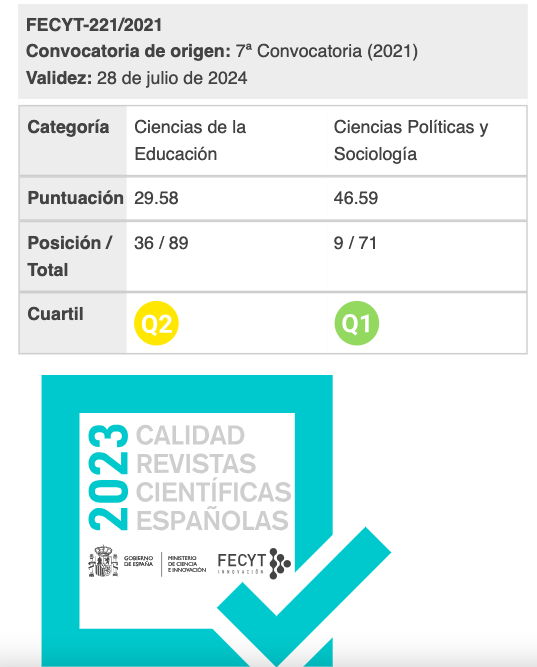Mother Tongue and School Failure in Multilingual Country
Keywords:
Downloads
Abstract
Spain is a multilingual country where three additional official languages coexist (Catalan, Basque and Galician) with the state language (Spanish). The high costs of translation impose that policy makers are permanent negotiating which percentage of information should be provided in each language. Against this background, the language in the field of education is a controversial topic. In this research we focus on how students´ mother tongue, as an ethnic attribute, determines their school performance. Our results confirm that there is a premium for those students whose mother tongue is Catalan, and that living in those communities where Basque and Galician are spoken, affects also positively the academic performance.
Downloads
References
Alvarez, A. (2005). Multilingual issues in Spain. Country report. Madrid: Minerva.
Google Scholar CrossrefBagna, C. (2006). Italian Schools and New Linguistic Minorities: Nationality vs. Plurilingualism. Which Ways and Methodologies for Mapping these Contexts? Foundazione Eni Enrico Mattei Working paper, 63.
Google Scholar CrossrefBetts, R.B., & Fairlie, R.W. (2001). Explaining Ethnic, Racial, and Inmigrant Differences in Private School Attendance. Journal of Urban Economics, 50, 2651.
Google Scholar CrossrefChiswick. B., & Miller, P.W. (1994). Language Choice among Immigrants in a MultiLingual Destination. Journal of Population Economics, 7, 119131.
Google Scholar CrossrefCoulombe, S., & Tremblay, J.F. (2008). Migration and Skills Disparities across the Canadian Provinces. Ottawa: Regional Studies
Google Scholar CrossrefCreese, A., Blackledge, A., Barac, T., Bhatt, A., Hamid, S., Wei, L., Lytra, V., Martín, P., Wu, C.J., & Yagcioglu, D. (2011). Separate and flexible bilingualism in complementary schools: Multiple language practices in interrelationship. Journal of Pragmatics, 43, 11961208.
Google Scholar CrossrefDixon, L.Q. (2011). The role of home and school factors in predicting English vocabulary among bilingual kindergarten children in Singapore. Applied Psycholinguistics, 32, 141168.
Google Scholar CrossrefEuropean Commission (2006). European and their Languages. Special Eurobarometer 243.
Google Scholar CrossrefFishman, F. (1989). Language and Ethnicity in Minority Sociolinguistic Perspective. Clevedon, UK: Multilingual Matters.
Google Scholar CrossrefGarcía, O., & Sylvan, C.E. (2011). Pedagogies and Practices in Multilingual Classrooms: Singularities in Pluralities. Modern Language Journal, 95, 385400.
Google Scholar CrossrefGarretaBochaca, J. (2006). Ethnic minorities and the Spanish and Catalan educational systems: From Exclusion to Intercultural
Google Scholar CrossrefRISE International Journal of Sociology of Education 1 (2) 177
Google Scholar CrossrefHornberger, N.H. & Link, H. (2012). Translanguaging and transnational literacies in multilingual classrooms: a biliteracy lens. International Journal of Bilingual Education and Bilingualism, 15, 261278.
Google Scholar CrossrefHuang, T.C. (2005). Sensitizing Students to CulturalLinguistic Diversity through EnglishLanguage Classes in a Multicultural Taiwan. Canadian Journal of Development Studies, 26, 257 274.
Google Scholar CrossrefLago, C., & Aguayo, E. (2004). Migraciones Interiores en España: Un Modelo Econométrico Regional 19802000. Regional and Sectorial Studies, 4, 121138.
Google Scholar CrossrefLytra, V. (2009). Constructing academic hierarchies: teasing and identity work among peers at school. Pragmatics, 19, 449466.
Google Scholar CrossrefMacKinnon, M. (2000). Unilingues ou Bilingues? Les MontreAlais sur le Marche du Travail en 1901. L’Actualite Economique/Revue D’Analyse Economique, 76, 137158.
Google Scholar CrossrefMansoor, S. (2003). Language Planning in Higher Education: Issues of Access and Equity. Labour Journal of Economics, 8, 1742.
Google Scholar CrossrefOgbu, J.U. (1992). Understanding Cultural Diversity and Learning. Educational Researcher, 21, 514.
Google Scholar CrossrefOller, J., Vila, I., & Zufiaurre, B. (2012). Student and teacher perception of school involvement and their effect on multicultural education: a Catalonian survey. Race ethnicity and education, 15, 353378.
Google Scholar CrossrefPeleato, I.V. (2011). Bilingual Education in the United States of America. Case Studies of an Elementary School. ESE Estudios sobre Educación, 21, 139158.
Google Scholar CrossrefRendon, S. (2007). The Catalan Premium: Language and Employment in Catalonia. Journal of Population Economics, 20, 9331433.
Google Scholar CrossrefRiches, C., & CurdtChristiansen, X.L. (2010). A tale of two Montreal Communities: Parents ́ perspectives on their children ́s language and literacy development in a multilingual context. Canadian modern language review Revue Canadienne des langues
Google Scholar CrossrefGilLacruz & GilLacruz Mother Tongue and School Failure in a Multilingual Country
Google Scholar CrossrefSahlberg, P. (2004). Teaching and Globalization. Managing Global Transitions, 2, 6583.
Google Scholar CrossrefSaravia, E., & Bernaus, M. (2008). Motivation and attitudes towards languages in university students: future foreign language studies and future nurses and physiotherapists. Porta Linguarum, 10, 163184.
Google Scholar CrossrefSchmid, C.L. (2001). Educational Achievement, LanguageMinority Students, and the New Second Generation. Sociology of Education Extra Issue, 7181.
Google Scholar CrossrefSingh, S.P. (2002). Technical Education in India: Some Emerging Issues. Indian Labour Economics, 45, 11491162.
Google Scholar CrossrefSpanish Governmental Delegation for the National Plan on Drugs (2004). Spanish National Survey on Drug Use in the School Population. Madrid: Spanish National Ministry of Health.
Google Scholar CrossrefSpanish National Institute of Statistics (2004). Regional and National Counts 20002006. Available: http://www.ine.es/daco/daco42/cre00/cre0106u.xls.
Google Scholar CrossrefSpanish Ministry of Education and Science (2005). Foreign Students 2004/05. Available: http://www.mepsyd.es/mecd/gabipren/documentos/files/estadis datcif200405.pdf.
Google Scholar CrossrefVedder, P. (2005). Language, Ethnic Identity, and the Adaptation of Immigrant Youth in the Netherlands. Journal of Adolescent Research, 20, 396416.
Google Scholar CrossrefWorswick, C. (2004). Adaptation and Inequality: Children of Immigrants in Canadian Schools. Canadian Journal of Economics/Revue Canadienne D’Economique, 37, 53-77.
Google Scholar CrossrefDownloads
Published
Almetric
Dimensions
How to Cite
Issue
Section
License
All articles are published under Creative Commons copyright (CC BY). Authors hold the copyright and retain publishing rights without restrictions, but authors allow anyone to download, reuse, reprint, modify, distribute, and/or copy articles as the original source is cited.















